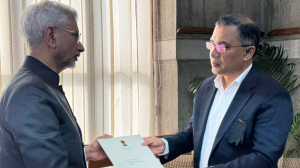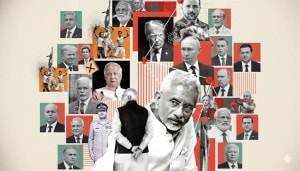Explained: The protests that forced Ecuador’s capital to move
The indigenous groups protesting a rollback in fuel subsidies in Ecuador have arrived at an agreement with the government, bringing to an end to the largescale demonstrations that have brought the Latin American country to a standstill.
 Demonstrators hold rocks during protests after Ecuador’s President Lenin Moreno’s government ended four-decade-old fuel subsidies, in Quito, Ecuador October 4, 2019. REUTERS/Ivan Alvarado
Demonstrators hold rocks during protests after Ecuador’s President Lenin Moreno’s government ended four-decade-old fuel subsidies, in Quito, Ecuador October 4, 2019. REUTERS/Ivan Alvarado
In an important breakthrough, the indigenous groups protesting a rollback in fuel subsidies in Ecuador have arrived at an agreement with the government, bringing to an end the largescale demonstrations that have brought the Latin American country to a standstill.
Ecuador had been roiled by unrest since the beginning of October, when President Lenín Moreno enacted austerity measures following a $4.2 billion loan from the International Monetary Fund (IMF). Under the deal reached on Monday between the government and protesters, Moreno will now withdraw the IMF package and reintroduce fuel subsidies.
On October 7, the protests forced Moreno to shift the government from Quito, the nation’s capital, to the coastal city of Guayaquil. Although the protests were peaceful when they began, a spate of violent incidents caused Moreno to order a 24-hour curfew in Quito on Saturday, and to deploy the army in its streets.
The Spanish-language Ecuadorian daily El Comercio in its editorial on October 13 said: “Where there is rule of law, varying opinions must express themselves and channel themselves democratically… We, the peace-loving people of Ecuador are more than the violent hordes that we must all reject.”
What led to the resentment?
In March 2019, the oil-dependent Ecuador secured a $10.2 billion bailout package from the IMF and other institutions, of which $4.2 billion were to come as a loan from the IMF.
The bailout package was necessitated by poor economic growth and deficits ever since oil prices dropped a few years ago. The Wall Street Journal reported that the country’s growth slowed from 2.4% in 2017 to 1.1% in 2018.
Lenín Moreno, who defeated left-leaning mentor-turned-rival Rafael Correa in the presidential elections of 2017, has been trying to make Ecuador’s economy more market-oriented.
To meet the IMF’s targets, Moreno on October 1 announced a rollback of fuel subsidies that were in place in the Andean nation since the 1970s.
The protests
After the government cancelled the fuel subsidies, petrol and diesel prices shot up, and a massive backlash followed on the streets.
Apart from clashes with security forces, protesters even entered some of Ecuador’s oil fields. Several officers were taken hostage in different parts of the country, the BBC reported.
The government had to be shifted from capital Quito to Guayaquil, where there were fewer disturbances.
The protests were led by indigenous groups, who in the past have ousted three Presidents. Indigenous people make up more than a quarter of Ecuador’s population of 1.7 crore.
Facing stiff resistance, including calls for resignation, President Moreno pinned the blame on organised crime, and also accused his predecessor Rafael Correa of plotting a coup against him. Correa denied the allegations.
On Monday, protesters who had been calling for the withdrawal of fuel subsidy cuts secured a major victory, as Moreno was forced to give in to their demands. A new law will now be passed aiming to stop the misuse of fuel subsidies.
- 01
- 02
- 03
- 04
- 05






































